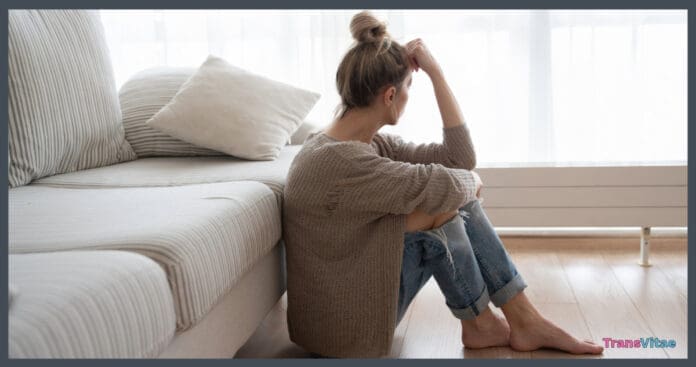In a recent study by the Centers for Disease Control and Prevention (CDC), the stark reality of loneliness among bisexual and transgender adults has been brought to light. The findings paint a troubling picture of social isolation and its impact on mental health within the LGBTQ+ community. This article delves into the study’s findings, exploring the higher prevalence of loneliness among bisexual and transgender individuals compared to their straight and cisgender counterparts and highlighting the urgent need for supportive interventions.
The Loneliness Epidemic
Loneliness, often described as the feeling of being socially isolated or lacking social connections, has profound effects on mental and physical health. According to the CDC’s 2022 Behavioral Risk Factor Surveillance System, bisexual adults reported the highest levels of loneliness at 56.7%, followed closely by transgender individuals, whose loneliness rates ranged from 56.4% to 63.9%. In stark contrast, only 30.3% of straight adults and 32.1% of cisgender adults reported feeling lonely.
Dr. Adjoa Smalls-Mantey, a New York-based psychiatrist, emphasized the significance of these findings. “We know that people that are part of the LGBTQ+ community often face isolation, but this study is important in that it highlighted the degree that they are isolated compared to people not part of that community,” she told ABC News. The data underscores the critical need for social and emotional support for LGBTQ+ individuals, particularly bisexual and transgender adults.
Mental Health Struggles
The study also examined the prevalence of mental health issues among LGBTQ+ individuals, revealing that loneliness often accompanies other mental health struggles. Over one-third of bisexual adults (34.3%) reported feelings of stress, compared to just 12.6% of straight adults. Similarly, up to 37.8% of transgender adults reported stress, while only 13.9% of cisgender adults experienced the same.
Depression rates were also alarmingly high among bisexual and transgender individuals. More than half of bisexual adults (54.4%) and up to 67.2% of transgender adults reported a history of depression, compared to just 19.4% of straight adults and 21.4% of cisgender adults. These statistics highlight the profound impact of social isolation and the urgent need for comprehensive mental health care for LGBTQ+ individuals.
The Impact of Loneliness on Health
Loneliness is not just an emotional burden; it has tangible effects on physical health. Research has shown that loneliness and social isolation can lead to poor health outcomes, including increased risks of heart disease, stroke, and premature death. Dr. Judith Joseph, a clinical assistant professor at NYU Health, noted the importance of social interactions in mitigating these risks. “Small interactions, like chatting with a barista or a store clerk, can make a significant difference in reducing feelings of isolation,” she said.
The CDC study’s authors emphasized the importance of addressing the mental health needs of LGBTQ+ individuals by providing services that focus on reducing loneliness and enhancing social support. Creating safe spaces for relationship-building and support within communities can play a crucial role in improving mental health outcomes.
Limitations and Future Directions
The study had some limitations, including data collection from only 26 states, which may not be representative of the entire U.S. adult population. Despite this, the findings offer valuable insights into the challenges faced by bisexual and transgender individuals. The authors recommend integrating standardized measures of social connection into public health frameworks to better identify risk factors and guide interventions.
The high rates of loneliness and mental health issues among bisexual and transgender adults call for immediate and concerted efforts to create supportive environments. Healthcare providers, community organizations, and policymakers must work together to ensure that LGBTQ+ individuals have access to culturally competent care and social support networks.
Dr. Smalls-Mantey emphasized the importance of understanding and addressing the unique challenges faced by LGBTQ+ individuals. “Many LGBTQ+ patients I see discuss feeling lonely and isolated or facing rejection. They often don’t feel comfortable coming out to people closest to them, leading to self-imposed isolation,” she said.
Addressing these challenges requires a multifaceted approach, including:
- Enhanced Mental Health Services: Providing access to mental health services that are affirming and culturally competent can help reduce feelings of isolation and improve overall well-being.
- Community Support Programs: Developing community programs that foster social connections and provide safe spaces for LGBTQ+ individuals to build relationships can mitigate the effects of loneliness.
- Public Awareness Campaigns: Increasing awareness about the mental health challenges faced by bisexual and transgender individuals can help reduce stigma and encourage acceptance and support from the broader community.
The Bottom Line
The CDC’s study highlights a critical public health issue: the pervasive loneliness and mental health struggles among bisexual and transgender adults. As a society, we must recognize the unique challenges faced by these individuals and take proactive steps to provide the support and resources they need to thrive.
By fostering inclusive environments, offering comprehensive mental health care, and promoting social connections, we can help alleviate the burden of loneliness and improve the quality of life for bisexual and transgender individuals. It is a collective responsibility to ensure that everyone, regardless of their sexual orientation or gender identity, feels valued, supported, and connected.
As we continue to celebrate Pride Month, let us remember that true pride comes from creating a world where everyone can live authentically and without fear of isolation or rejection. Together, we can build a more inclusive and compassionate society for all.


